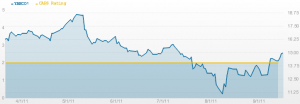
How I Learned to Stop Worrying, Part 2: Algorithms Make Us More Human
Recently, my colleague Ryan Warren made some astute comments about the emerging importance that algorithms are now playing in our economy, society and daily lives. Like Ryan, I believe that smart people writing creative algorithms are the guts and magic that glue together much of the wonder and advancement in modern life. Algorithms are tools, and in the end, it’s the use of tools that make us fundamentally human.
I am often surprised how when reading articles, technical papers and reading the news, how a particular phrase pops out and hits me. The human mind is an amazing thing: It’s ability to take in, digest and synthesize information is magic. It’s like an “ah-ha” moment when out of all the text, information and perspective, a particular phrase catches the eye, stimulates the old grey matter and in a split-instant a new connection is made.
As I read Jane Wakefield’s recent article on BBC News, I had one such moment. As I was reading, the following quote caught my eye:
“Increasingly … we are knowing where information can be found rather than retaining knowledge itself.”
Suddenly, I found myself thinking about watching Donald Trump in an episode of the Apprentice, and then being involved in yearly business strategy meetings at several companies I have had the pleasure to work at, and then on to the several years consulting with Companies related to branding and marketing challenges.
And thus, new connections were made. In each of these situations, people were being asked to work on projects where they had to rapidly become experts in a subject area, enough to make and execute on business plans. And today, this is far from uncommon. With the pace and demands on today’s knowledge workers—business professionals who need information on which to base their daily decisions—and the inexorable drive towards higher efficiency and productivity, major changes in how we work are occurring. For example:
• Knowledge workers now move from project to project, with few jobs remain static in their responsibilities. A Marketing Professional may be writing an op-ed article one day, and the next working on the company’s strategic plan.
• Self-service is now the way of working. Why ask a researcher or admin to get information, when there are tools out there like the Web where information can be at hand in a matter of minutes or even seconds?
• Just-in-time information delivery is now expected, with no tolerance for waiting days for information to be delivered, and thus …
• The speed of work is increasing. The ability to rapidly understand a project’s business requirements, be able to do essential subject matter research, and get up to speed fast is essential, as successful professionals are those who are viewed as having a track record of working on fast, high-impact projects.
And a thread common to all these developments is that success is now often determined by a person or team’s ability to rapidly acquire information and data upon which to base implementation and operational decisions.
In this kind of environment, the need for a tool like FirstRain was perhaps inevitable. With FirstRain Monitors, business professionals can easily track the markets, companies and business-related topics that are of interest to them. They are easy to setup and provide current, daily or weekly updates. In today’s business world, business monitoring needs to be useful quickly and have value only for the duration of the project being worked on now. FirstRain’s display engine responds to this by preferentially displaying a user’s most recently active Monitors.
But our new just-in-time paradigm has risks. Our understanding of the meaning of content requires context and interpretation, and this can take time we’re often unwilling to wait for. Viewed in isolation, a piece of news may seem to have a very different meaning than it does when combined with the right historical context.
YHOO: Previous 7 Days
YHOO: Previous 1 Year
For example, an examination of Yahoo!’s results over the last week tells a very different picture than would see once you step back and look at that firm’s performance over the last year. The human mind is a great tool for synthesizing perspective based on long-term acquired knowledge—we call this learning. And it is the connection between news items and other pieces of information that provides context and the tools for critical discernment—as professionals we call this experience. Our individual ability to make smart decisions is based on the information at hand, processed through all the biases and filters represented by our past experiences and personal beliefs. To succeed and make smart decisions, we need a mixture of the right data, the right tools, the right context and the right experience. Algorithms, and tools like FirstRain, can help by providing not just the news, but timelines of related significant events and topics of further interest.
In the end, it’s the man-machine combination that creates a unique ability to assimilate information, synthesize pertinent results and make sound business decisions. In other words, it’s a continuation of that amazing innovation that’s helped us succeed as a species: the ability to make and use tools—tools that feed us, that shelter us, that move us, and that deliver us the information we need to shape our world.



